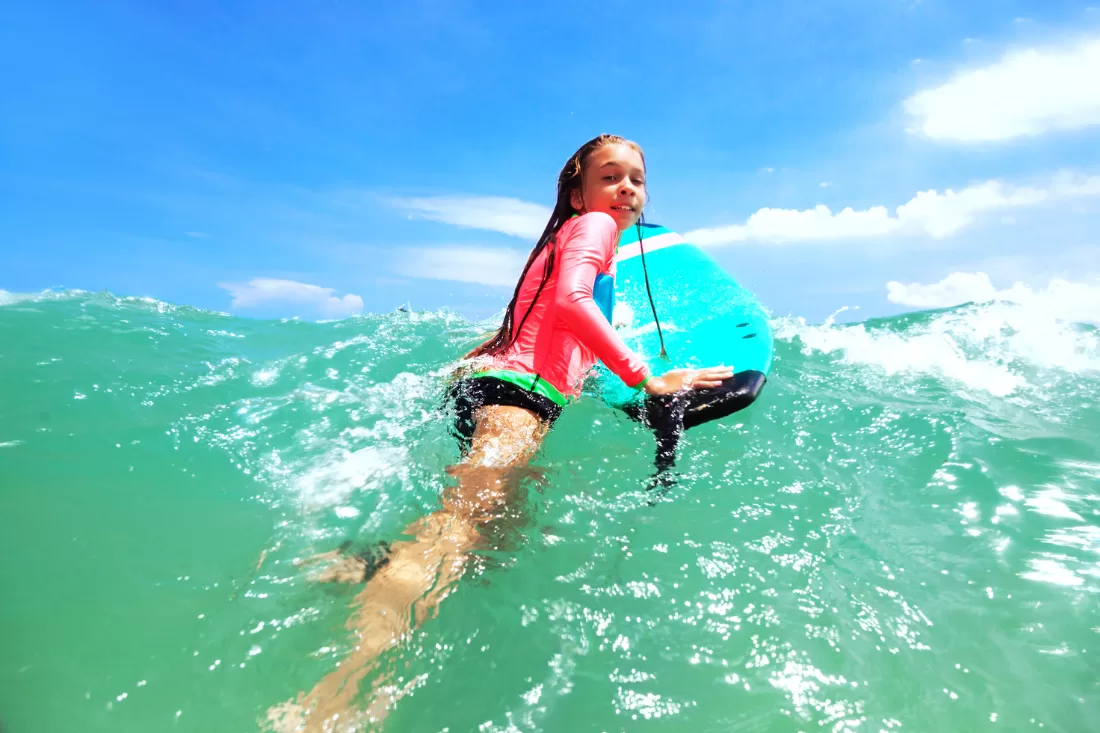Surfing: More Than a Sport – A Rad Lifestyle and Spiritual Journey
Finding Balance and Clarity on the Water!
Finding Balance and Clarity on the Water!

Surfing is fun. Totally rad. Gnarly.
If you are at the beach, on vacation, or just out for a good time, splashing around in the water is guaranteed to give you a rush of positive vibes, even if you fall off your board more than you ride the breaks and waves.
Good fun is important for any pastime, but surfing is more than that. It’s a sport with its own culture, language, and rituals. It not only keeps you fit and active, but it also shapes your lifestyle. In ways almost no other sport does, it is considered to positively enhance your mental and emotional health too.

Surfing has been around for a very long time. It is acknowledged to have been practiced by South Pacific islanders as early as the fifteenth century. It was integral to life for ancient islanders, and the study of waves was called ka nalu in their native language. The stories of notable surfing moments and events were preserved in meles—chants and songs—and passed down through the generations.
Even today, there are sites and locations that hold a profound spiritual and religious meaning for surf communities. In Kahau’u Bay on Hawaii’s Kona Coast, there stands a large structure fashioned out of black lava rock called Ku’emanu Heiau where surfers follow in their forebears’ wake to pray for good waves.
As surf culture has spread, many modern surfers still combine their love of the sport with religious or spiritual rituals. Every Sunday morning in Huntington Beach, California, surf disciples meet for a beach service and prayers, followed by a paddle-out led by their minister.
Surfing is unique in that it quickly becomes a lifestyle, shaping and influencing its devotees’ mental and emotional health in ways other sports and hobbies don’t.
According to Shane Reynolds—a surfer, videographer and global adventurer—surfing isn’t just a sport; it’s a lifestyle that teaches us balance. “It’s about understanding the balance between physical exercise and mental focus, adrenaline and relaxation, technology and nature, fear and commitment,” said Reynolds. “Those who don’t take to surfing probably focus too much on the literal act of riding waves.”
“Anyone who thinks surfers are slackers is very mistaken,” said restaurateur, avid surfer, and 30A local, Dave Rauschkolb. “Surfing is mostly work—95% paddling, positioning, and getting pounded by waves, and 5% utter joy and pleasure. Every bit of that work is worth it for every second on a wave.”

There is much research to back up the claim that surfing has positive effects on our mental health. One of the most significant benefits identified is the release of endorphins—the body’s natural painkillers, which help reduce anxiety, ease stress, and improve our mood.
Surfing is an outdoor pursuit too, and another significant benefit is that connection to the world around us. Surfers talk of a sense of well-being as they sit astride their boards, waiting for the right wave, surrounded by nature.
“The act of surfing engages fear, excitement, and adrenaline,” Rauschkolb said. “When you step out of the water, you feel supercharged with energy and positivity. Surfers call this ‘being surfed out,’ and it’s incredible. Surfing builds confidence to live a full and positive life.”
According to Reynolds, every wave is different, so surfing never gets old.
“After almost forty years of paddling out, it’s still as exciting to me as it was when I was twelve.”
Being alone in the ocean can give you a sense of your place in the world and be a calming and peaceful experience to ground you and make you feel more centered. Researchers believe that knowing you are part of something bigger is a positive spiritual and mental boost.
Surfing also helps boost confidence. Catching a wave is a big thing. As with any pursuit, when we succeed, we feel a sense of achievement and pride. This positive view of self can spill over into other areas of our working or personal lives, boosting our confidence and self-belief.
Reynolds explained how surfing has impacted his mental wellness. “When I was young, it helped manage my ADHD, taught me to face my fears, and focused me on what was important. Now, it’s an escape that allows me to shut off all the noise and live 100% in the moment. I honestly don’t know what I would do without it.”
But there are more complex advantages for our mental health from surfing too. One of the most important is the ability to be resilient. Surfing can be a dangerous activity, and one of the biggest mental challenges is overcoming that fear. Even for the most experienced surfers, understanding the risks and threats of large waves, strong currents, and rocks and reefs can never be taken lightly.
It is easy to be intimidated by these dangers, but to overcome these fears requires mental toughness, fortitude, and the ability and willingness to push ourselves beyond our comfort zone and into the uncertain and unknown.

Surrounded by so many variables and distractions, surfers often operate on a different level. They find they react without conscious decision-making to their surroundings, intuitively knowing the right speed and angle of entry, adjusting their feet and balance as the wave moves beneath them, and gauging when the right moment is to take the drop or end the ride.
It is that moment when it all comes together when everything just clicks. This is called flow state—something of a mental nirvana for surfers.
Perhaps it comes down to years of experience, well-honed muscle memory, or plain old good luck, but this is the mental condition surfers rage about. At that moment, they find themselves completely immersed in the activity. They report it as being almost timeless and weightless, which they liken to an out-of-body experience—they forget everything else and it is just them, the board, and the wave.
Surfing is probably the perfect sport for achieving this heightened flow state. It is the time when you are reacting to the water and the wave; not thinking, just doing.

While much of the pleasure of surfing is that sense of personal achievement, it also provides another great mental benefit: community.
“It is a brotherhood and sisterhood,” said Rauschkolb. “As a surfer, you never meet a stranger—you paddle out, share waves, and enjoy the positive experience from that simple act.”
Surf culture has always been about being part of a club or a tribe, sharing a common way of life. Clothing, vehicles, language, and locations all help us feel that sense of belonging, being part of the group. You are no longer just you; you are one of us.
“I looked up to the older surfers in our area when I was young,” said Reynolds. “I wanted their respect, which pushed me to become a better surfer. Now, I respect anyone who embraces the positive aspects of the surfing lifestyle, regardless of skill level.”
For Reynolds, it’s not just about being the best surfer. “Some younger surfers get it, but it can take years for others. Those who never get it are typically the most aggressive in the lineup.”
That connection provides opportunities for wider social interaction, shared experiences, and celebrations. Surfing with friends is a joyful and rewarding pastime where the successes and failures are shared, lessons are learned, and support is offered.
And as with any high-intensity sport, of course, there are downsides to consider too.
Perhaps the most significant is injury or loss of life. Surfing is a dangerous sport and Mother Nature is not to be trifled with. Not only are there risks of catastrophic injury and death, but with such an exhilarating sport, stresses and strains can provoke injuries too.

Another consideration is the frustration surfers can sometimes run into. Surfers report their exasperation at those who don’t share their respect and love for the oceans. While paddling out in the open water, coming into physical contact with waste, sewage, and discarded trash is a serious physical and mental risk.
Surfers have long been on the front line of campaigns to invest in better water systems, keep our beaches clean, and prevent the daily disposal of hundreds of millions of single-use plastic wrappers and containers that harm and damage our oceans, marine life, and coastlines.
“Protecting our ocean environment and ensuring access to all beaches is paramount,” Rauschkolb said. “The oceans, gulfs, and even lakes should be for everyone to enjoy. I have worked tirelessly on conservation and access initiatives.”
For Reynolds, surfing is a constant reminder of the importance of our oceans. “Our lives depend on them, as does my livelihood. As an underwater cinematographer, I try to inspire people to protect the oceans through imagery. Many people live inland, and the last thing I want is for the ocean to be ‘out of sight, out of mind.’”

But surfing can be the best of times.
Reynolds offers advice and support to those considering surfing. “The juice is worth the squeeze. When you first start, you may feel lost and overwhelmed among surfers who seem far more comfortable. Just know, they all felt that way at some point too. When it clicks, it will change your life forever.”
It can have a deep and meaningful impact on our wellness and mental health. While the risks can’t be ignored and should never be laughed off, the rewards significantly outweigh them.
The power of positive thinking, the pride and sense of achievement, and the camaraderie and community that surf culture incubates are what keep us coming back for more.
“The act of riding a moving mountain, whether large or small, is an exquisite pleasure,” said Rauschkolb.
“Surfing has shaped my philosophy, giving me the confidence that anything is possible if you put your mind to it. Surfing is a gift for anyone wishing to live a life full of fun and personal development.”
So, if you haven’t tried surfing yet, grab a board and give it a go. It can be a perfect escape for an afternoon or a long weekend with friends.
Who knows, you may get bitten by the bug, and before you know it, it has evolved into a spiritual calling—one in which you find yourself checking hourly weather and surf reports, trying to balance work calls and meetings with high tide tables, hunting for cheap flights to legendary surf spots where the weather suits your clothes, or browsing real estate websites for that perfect little beachside condo somewhere on the Pacific Coast of Costa Rica.
Yaw! Surf’s up, dude.

